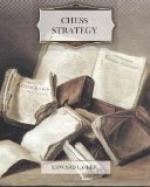Black’s game cannot be saved. If l5. ... Kt(Kt5)xKP there follows 16. KtxKt, KtxKt; 17. Kt-Q5, Q-Q3; 18. BxKt, PxB; 19. RxB, or 16. ... PxKt; 17. Q-R5ch, P-Kt3, 18. Q-R6.
16. P-Kt4!
Now White initiates a brilliant attack, driving it home without giving Black a moment’s rest. If Black takes the pawn, White plays Kt-Q4, with many threats, e.g. P-B4; 18. Kt-Q5, Q-Q3; 19. Kt-K6, or l7. ... Kt(Kt5)-B3; 18. Kt-K6, etc.
16.
... B-R2
17.
BxKtP
The sacrifice is fairly obvious, as White obtains three pawns for the piece, and moreover drives the King into the field of battle. However, this does not detract from the beauty of the game, which is full of brilliant phases.
17. ... RPxB 18. KtxKtP Q-Q1
Or Q-Kt3; 19. Kt-Q6ch, K-K2; 20. Kt-B5ch, followed by Q-Q6.
19. Kt-Q6ch K-B1 20. RxP Kt-Kt3
The threat was: 21. Q-Q5, Kt-R3; 22. KtxB, RxKt; 23. R-Q6, etc. 20. ... Kt(Q2)-B3 is of no avail because of 21. Q-Kt3, Kt-R3; 22. KtxP, or 21. ... Q-Q2; 22. KR-B1, etc.
21. B-R4 Q-Q2 22. KtxB! QxR
Not RxKt because of 23. QxQ. Now Black is a whole Rook ahead. But it is as much out of play as his Queen’s side pieces. The King is driven into a mating net by the concentration of superior White forces, and only escapes by giving up the extra piece.
23. Q-Q8ch Q-K1 24. B-K7ch K-B2 25. Kt-Q6ch K-Kt3 26. Kt-R4ch K-R4
If K-R3 there follows mate in three by 27. Kt(Q6)-B5ch; 28. Kt-Kt3ch; 29. B-Kt5 mate.
27. KtxQ RxQ 28. KtxPch K-R3 29. Kt(Kt7)-B5ch K-R4 30. P-KR3!
This threatens 31. PxKtch, KxP; 32. P-B3ch, followed by P-Kt3 or Kt4 mate. If Black plays 30. QR-KKt1, White wins as follows: 31. PxKtch, RxP; 32. P-B3, Kt-B1ch; 33. K-R2, KtxB; 34. PxRch, KxP; 35. KtxKt, K x Kt; 36. R-B7. If 30. ... Kt-R3; 31. Kt-Kt7 mate.
30. ... Kt-B1 31. PxKtch KxP 32. BxR RxB 33. P-Kt3 R-Q7 34. K-Kt2 R-K7 35. P-R4 Kt-Kt3 36. Kt-K3ch K-R4 37. P-R5 Kt-Q2 38. Kt(R4)-B5 Kt-B3 39. P-Kt5 B-Q5 40. K-B3 R-R7 41. P-R6 B-R2 42. R-B1 R-Kt7 43. P-Kt4ch K-Kt4 44. R-B7 RxPch 45. KxR KtxKtPch 46. K-B3 Resigns.
Game no. 44
White: Dus Chotimirski. Black: Vidmar.
Queen’s Pawn Game.
1. P-Q4 P-Q4 2. Kt-KB3 P-QB4 3. P-B3 P-K3 4. B-B4
We have seen on page 55 that Black can hardly develop his QB without disadvantage. White, however, has no difficulty in doing so, as his QP is protected, and after Black’s Q-Kt3 he has only to look after his KtP. He could play Q-B1, which might bring the Q into effective action on the diagonal to R6.




